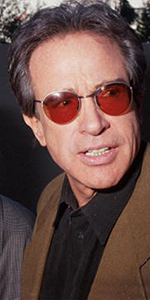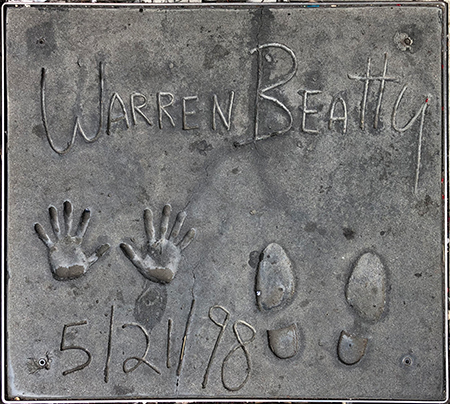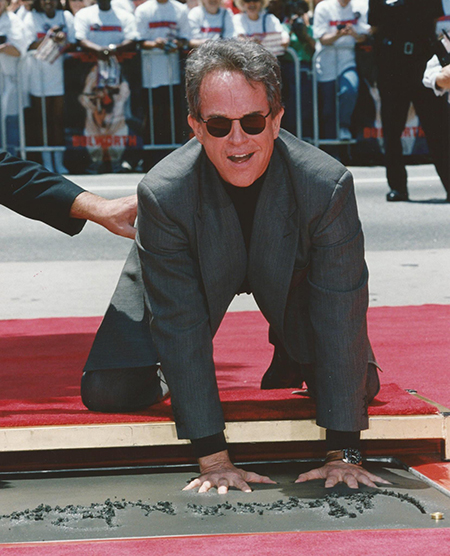 |
 |
 |
 |
 |
| Warren Beatty, circa 1992. |
| |
|
 |
| |
 |
| |
 |
| |
 |
| |
 |
| |
 |
| |
|
|
| Warren Beatty |
 |
| Forecourt Ceremony held on Thursday, May, 21, 1998 |
| |
Born: Henry Warren Beaty, March 30, 1937, in Richmond, Virginia
Age at the time of the ceremony: 61
|
| |
Warren Beatty is perhaps one of Hollywood's best-known personalities. On the scene since the early 1960s while conducting a notorious private life, Beatty seized control of his films, first producing, then directing them. He amazed the world by settling down with Annette Benning in 1992, and starting a family.
Both of Beatty's parents were educators, with his mother being a drama teacher. After moving around a bit, the family settled down in Arlington Virginia, outside of Washington D.C., with his older sister, Shirley MacLaine.
Entranced by the movies as a kid, Beatty was affacted by The Phildelphia Story with Katherine Hepburn, and Love Affair with Charles Boyer. He liked listening to the recordings made by Al Jolson and did impressions of Milton Berle. Excelling in high school football, Warren worked as a stagehand at the National Theatre in Washington his senior year; after graduation, he went to Northwwestern University. In 1954, he dropped out to go and study acting with Stella Adler in New York.
Like many actors at the time, Beatty appeared on television shows produced in New York, like
Kraft Theatre, where his episode aired over NBC in June 1957, and Studio One in Hollywood aired over CBS in September 1957. Beatty played Milton Armatige in five episodes of The Many Loves of Dobie Gillis aired over CBS from October 1959 to January 1960.
Meanwhile,
he made his Broadway debut in William Inge's A Loss of Roses (with Michael J. Pollard in the cast), for only 25 performances, from November to December 1959. Beatty sought out director Elia Kazan and got the lead role in Splendor in the Grass (released in October, 1961) with Natalie Wood. The film was a major success and made Beatty an overnight star.
Beatty began seeking out directors he felt he could learn from. John Frankenheimer for All Fall Down (released in March 1962), Robert Rossen for Lillith (released in September 1964) with Jean Seberg, and Arthur Penn for Mickey One (released in September 1965) with Hurd Hatfield.
Beatty had ideas. He would mention them to his directors, who told him to stick to acting; Beatty couldn't understand why he couldn't contribute to more aspects of a film's production.
In 1965, he started his production company in order to make Bonnie and Clyde (released in September 1967) with Faye Dunaway. The film galvanized Hollywood and the nation. Was it genius, or was it crap? Many movie-goers and critics saw the film differently; many now say the film is a masterpiece.
Hollywood knew a good thing when it saw one. Director George Stevens put Beatty next to Elizabeth Taylor in The Only Game in Town (released in January 1970), but the film flopped. Stevens retired. The New Hollywood was taking over, leading to director Robert Altman starring Beatty in his deconstructivist western, McCabe & Mrs. Miller (released in June 1971) with Julie Christie.
Director Richard Brooks cast Beatty in his heist film,
$ (released in December 1971) with Goldie Hawn, then he worked with director Alan J. Pakula on The Parallax View (released in June 1974) with Paula Prentiss. This was followed by what is perhaps the most revealing Beatty performance: as George the Hairdresser in Shampoo (released in March 1975 with both Julie Christie and Goldie Hawn). It was a big hit.
While director Mike Nichols'
The Fortune (released in May 1975) with Jack Nicholson, bombed, Betty finally directed (with Buck Henry) a film: Heaven Can Wait (which played the Chinese in June 1978) with Julie Christie, which became such a runaway hit that Paramount bankrolled Beatty's dream project — a biopic of reporter John Reed — in Reds (played the Chinese in December 1981) with Diane Keaton. The epic film earned Beatty the Best Directing Oscar.
But Hollywood kept changing. Beatty starred in
Ishtar (released in May 1978) with Dustin Hoffman, but pre-release bad publicity made the film D.O.A. in 1,100 theatres across the country. Realizing this change, Beatty approached Disney to do a comic book movie: Dick Tracy (released in June 1990) with Madonna. The $100 million film only broke even.
Beatty's biopic of gangster Bugsy Siegel,
Bugsy (released in December 1991) with Annette Benning, did well enough, with Beatty and Bening marrying in 1992. Beatty always wanted to re-make Love Affair with Charles Boyer, so he did just that: Love Affair (released in October 1994) with Annette Benning, also starred Katherine Hepburn.
Beatty's strange comedy about race and politics,
Bulworth (released in May 1998) with Halle Berry, kinda came and went, as did Town & Country (released in April 2001) with Diane Keaton.
Eventually, Beatty returned to the director's chair while playing Howard Hughes in
Rules Don't Apply (which had its Premiere at the Chinese in November 2016) with Lily Collins. Warren co-wrote and co-directed a throwback film, Dick Tracy Special: Tracy Zooms In streamed over TCM in February 2023. |
|
|
|
|
| |
 |
 |
| Mann's Chinese Theatre, Hollywood, California. Warren Beatty Forecourt block. Executed by unknown, Thursday, May 21, 1998. 49 x 44 inches. |
 |
 |
 |
| Mann's Chinese Theatre, Hollywood, California. Warren Beatty Forecourt ceremony, Thursday, May 21, 1998. Warren Beatty flashes a grin while placing his hands in the cement. |
|
|